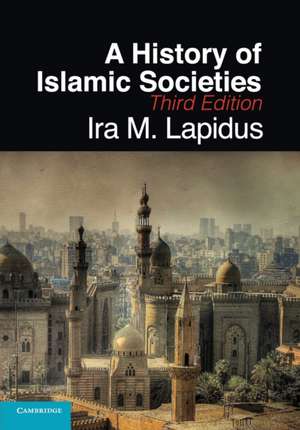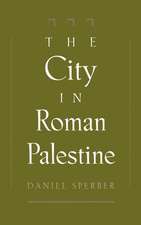A History of Islamic Societies
Autor Ira M. Lapidusen Limba Engleză Paperback – 12 oct 2014
| Toate formatele și edițiile | Preț | Express |
|---|---|---|
| Paperback (1) | 410.81 lei 6-8 săpt. | |
| Cambridge University Press – 12 oct 2014 | 410.81 lei 6-8 săpt. | |
| Hardback (1) | 638.47 lei 6-8 săpt. | |
| Cambridge University Press – 12 oct 2014 | 638.47 lei 6-8 săpt. |
Preț: 410.81 lei
Nou
Puncte Express: 616
Preț estimativ în valută:
78.62€ • 81.61$ • 65.55£
78.62€ • 81.61$ • 65.55£
Carte tipărită la comandă
Livrare economică 22 martie-05 aprilie
Preluare comenzi: 021 569.72.76
Specificații
ISBN-13: 9780521732970
ISBN-10: 0521732972
Pagini: 1017
Ilustrații: 42 b/w illus. 39 maps 19 tables
Dimensiuni: 177 x 254 x 38 mm
Greutate: 2.02 kg
Ediția:3 Rev ed.
Editura: Cambridge University Press
Colecția Cambridge University Press
Locul publicării:New York, United States
ISBN-10: 0521732972
Pagini: 1017
Ilustrații: 42 b/w illus. 39 maps 19 tables
Dimensiuni: 177 x 254 x 38 mm
Greutate: 2.02 kg
Ediția:3 Rev ed.
Editura: Cambridge University Press
Colecția Cambridge University Press
Locul publicării:New York, United States
Cuprins
Introduction to Islamic societies; Part I. The Beginnings of Islamic Civilizations: 1. Middle Eastern societies before Islam; 2. Historians and the sources; 3. Arabia; 4. Muhammad: preaching, community, and state formation; 5. Introduction to the Arab-Muslim empires; 6. The Arab-Muslim conquests and the socioeconomic bases of empire; 7. Regional developments: economic and social change; 8. The Caliphate to 750; 9. The 'Abbasid Empire; 10. Decline and fall of the 'Abbasid Empire; 11. Introduction: religion and identity; 12. The ideology of imperial Islam; 13. The 'Abbasids: Caliphs and emperors; 14. Introduction; 15. Sunni Islam; 16. Shi'i Islam; 17. Muslim urban societies to the tenth century; 18. The non-Muslim minorities; 19. Continuity and change in the historic cultures of the Middle East; Part II. From Islamic Community to Islamic Society: 20. The Post- 'Abbasid Middle Eastern state system; 21. Muslim communities and Middle Eastern societies: 1000–1500 CE; 22. The collective ideal; 23. The personal ethic; 24. Conclusion: Middle Eastern Islamic patterns; Part III. The Global Expansion of Islam from the Seventh to the Nineteenth Century: 25. Introduction: Islamic institutions; 26. Islamic North Africa to the thirteenth century; 27. Spanish-Islamic civilization; 28. Tunisia, Algeria, and Morocco from the thirteenth to the nineteenth centuries; 29. States and Islam: North African variations; 30. Introduction: empires and societies; 31. The Turkish migrations and the Ottoman Empire; 32. The postclassical Ottoman Empire: decentralization, commercialization, and incorporation; 33. The Arab provinces under Ottoman rule; 34. The Safavid Empire; 35. The Indian subcontinent: the Delhi Sultanates and the Mughal Empire; 36. Islamic empires compared; 37. Inner Asia from the Mongol conquests to the nineteenth century; 38. Islamic societies in Southeast Asia; 39. The African context: Islam, slavery, and colonialism; 40. Islam in Sudanic, Savannah, and forest West Africa; 41. The West African Jihads; 42. Islam in East Africa and the European colonial empires; 43. The varieties of Islamic societies; 44. The global context; Part IV. The Modern Transformation: 45. Introduction: imperialism, modernity, and the transformation of Muslim societies; 46. The dissolution of the Ottoman empire and the modernization of Turkey; 47. Iran: state and religion in the modern era; 48. Egypt: secularism and Islamic modernity; 49. The Arab east: Arabism, military states, and Islam; 50. The Arabian peninsula; 51. North Africa in the nineteenth and twentieth centuries; 52. Women in the Middle East: 19th–21st centuries; 53. Muslims in Russia, the Caucasus, Inner Asia, and China; 54. The Indian subcontinent: India, Pakistan, Afghanistan, and Bangladesh; 55. Islam in Southeast Asia: Indonesia, Malaysia, and the Philippines; 56. Islam in West Africa; 57. Islam in East Africa; 58. Universal Islam and African diversity; 59. Muslims in Europe and America; Conclusion: secularized Islam and Islamic revival.
Recenzii
Review of previous edition: 'This book is a major undertaking and deserves to be saluted as an outstanding achievement. Professor Lapidus' A History of Islamic Societies belongs to a rare breed of works.' World Quarterly
Review of previous edition: 'I do not think that any other world civilization can boast a comparable general account of such substance and quality. … This is a great deal more than a textbook. It is a product of learning, intellect and style of an extremely high order.' Journal of the Royal Asiatic Society
Review of previous edition: 'The value of A History of Islamic Societies lies in its sheer comprehensiveness. In one volume a vast amount of material is synthesized and presented in a clear and effective style. There is nothing else like it.' The Journal of Asian Studies
Review of previous edition: 'Lapidus is concerned not with defining an essential Islam, but rather with mapping the role of Islamic beliefs, institutions and identities in particular historical contexts.' International Journal of Middle East Studies
Review of previous edition: 'Ira Lapidus' A History of Islamic Societies has served students for twenty-five years as an accessible but thorough introduction to the full sweep of Islamic history. The book provides a powerful comparative framework for appreciating both diversity and continuity in Islamic historical experience.' Islam and Christian–Muslim Relations
Review of previous edition: 'By this singular work Lapidus, Professor Emeritus of History at the University of California, Berkeley, has … placed himself in the recording of Islamic history on a pedestal equivalent to Gibbon's for that of Rome.' The Book Review Literary Trust, New Delhi
Review of previous edition: 'I do not think that any other world civilization can boast a comparable general account of such substance and quality. … This is a great deal more than a textbook. It is a product of learning, intellect and style of an extremely high order.' Journal of the Royal Asiatic Society
Review of previous edition: 'The value of A History of Islamic Societies lies in its sheer comprehensiveness. In one volume a vast amount of material is synthesized and presented in a clear and effective style. There is nothing else like it.' The Journal of Asian Studies
Review of previous edition: 'Lapidus is concerned not with defining an essential Islam, but rather with mapping the role of Islamic beliefs, institutions and identities in particular historical contexts.' International Journal of Middle East Studies
Review of previous edition: 'Ira Lapidus' A History of Islamic Societies has served students for twenty-five years as an accessible but thorough introduction to the full sweep of Islamic history. The book provides a powerful comparative framework for appreciating both diversity and continuity in Islamic historical experience.' Islam and Christian–Muslim Relations
Review of previous edition: 'By this singular work Lapidus, Professor Emeritus of History at the University of California, Berkeley, has … placed himself in the recording of Islamic history on a pedestal equivalent to Gibbon's for that of Rome.' The Book Review Literary Trust, New Delhi
Descriere
This new edition of one of the most widely used course books on Islamic civilizations around the world has been substantially revised to incorporate the new scholarship and insights of the last twenty-five years. Ira Lapidus' history explores the beginnings and transformations of Islamic civilizations in the Middle East and details Islam's worldwide diffusion.














